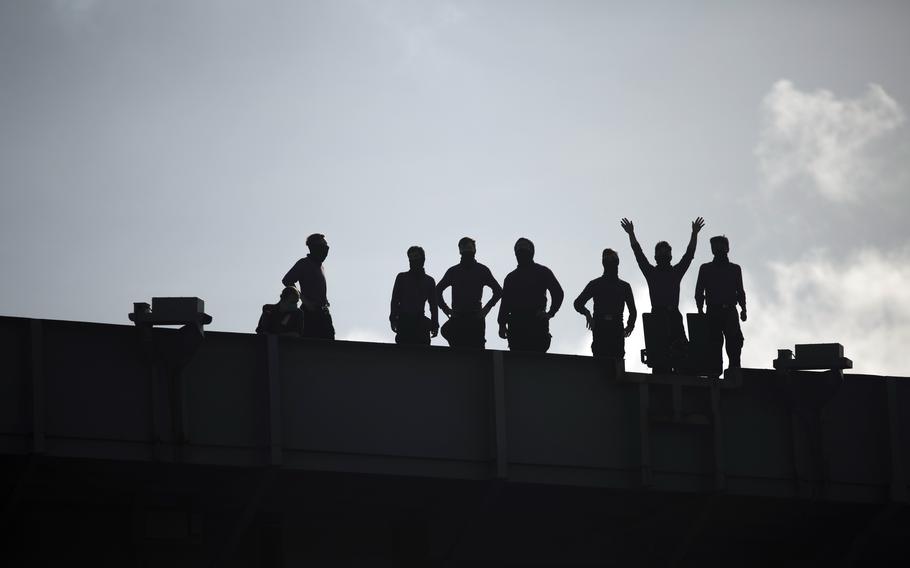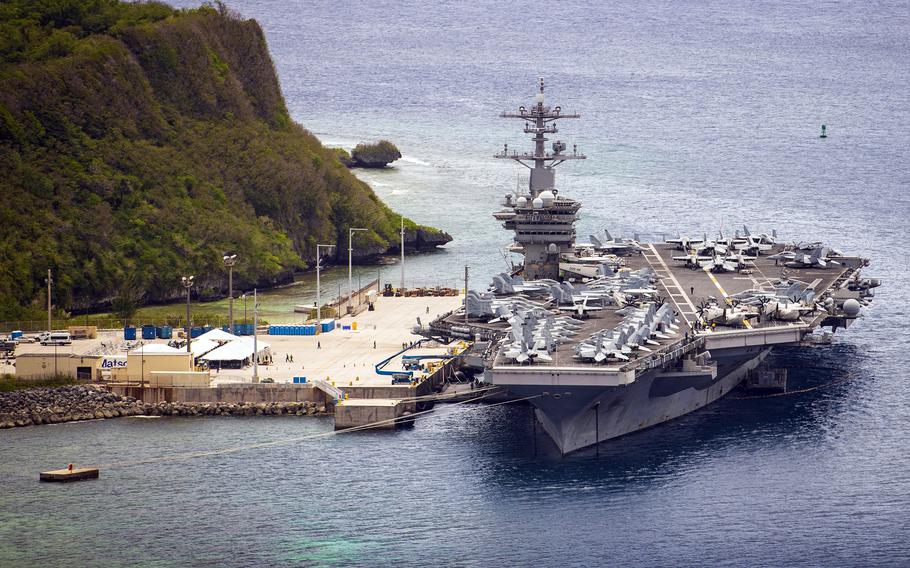
The aircraft carrier USS Theodore Roosevelt departs Apra Harbor following an extended visit to Naval Base Guam during the COVID-19 pandemic, May 21, 2020. (Jordan Gilbert/U.S. Marine Corps)
The people of Guam “are stronger than ever” as the public health emergency around the COVID-19 pandemic comes to an end, the island’s lieutenant governor said this week.
The U.S. territory on Thursday will mark the end of the emergency declared by the Department of Health and Human Services at the pandemic’s outset in January 2020.
“This crisis will be remembered for its global impacts, but we must never forget the tireless service of the healthcare workers and health systems that led us forward,” said Lt. Gov. Josh Tenorio in a news release Tuesday. “Today we are stronger than ever, and together we will work to build the prosperity of better days.”
The Guam Department of Public Health and Social Services said new COVID-19 cases are down 92% since January 2022, the peak of the virus’ omicron surge. Deaths are down more than 80% and hospitalizations are down almost that much, according to the release.
The island stopped free testing for COVID-19 in March. It last found 31 new cases, of which two were hospitalized, in 817 tests during the week of March 21-27, according to results posted on the department’s website.

The aircraft carrier USS Theodore Roosevelt moors at Naval Base Guam, May 15, 2020. (Conner Blake/U.S. Navy)
At the time, Guam had tallied 61,139 cases and 415 deaths over three years.
Gov. Lou Leon Guerrero lauded the resilience of Guamanians during the pandemic.
“As we find ourselves in an era of hope and promise, we look back on the challenges of the past three years and the ways in which our island and people showed unprecedented strength,” she said in the release.
USS Theodore Roosevelt
Though far from U.S. shores and with a population of 170,500, Guam played an outsized role early in the pandemic drama. In March 2020, news attention focused on a U.S. Navy aircraft carrier approaching the island as the virus swept its decks after a liberty stop in Vietnam.
The USS Theodore Roosevelt diverted to Guam with at least 39 cases of COVID-19 among its crew. The ship arrived March 26 and two days later the ship’s commander, Capt. Brett Crozier, assuming all sailors aboard were infected, lifted a quarantine order in the cramped aft birthing, citing “true human suffering” due to conditions there.
Eventually, more than 1,150 sailors aboard the Theodore Roosevelt became infected and one died. Crozier, faulted for an email made public describing the situation, was relieved of his post by Thomas Modly, acting secretary of the Navy.
Modly eventually resigned following the backlash for criticizing Crozier as “stupid” while addressing the crew aboard the ship.
‘We’re milking it’
Meanwhile, Navy officers on April 1, 2020, booked thousands of hotel rooms on Guam and moved the stricken sailors from the ship into quarantine.
On April 9, 2020, Chief Petty Officer Charles Robert Thacker Jr., who had been treated for COVID-19 at Naval Hospital Guam and released, was found unresponsive in isolation in his quarters on the base. He died four days later.
The carrier remained at Guam for two months, during which time Leon Guerrero was criticized for saying the island used the Navy emergency to leverage advantage from the federal government.
She said then-Secretary of the Navy Kenneth Braithwaite had agreed to return unused military land to Guam that would be the site of a new hospital.
“So, we're milking it,” she said. “We're milking it very hard.”
Leon Guerrero's spokeswoman, Krystal Paco-San Agustin, said Guam selflessly took in the carrier’s crew, without regard for what might be given in return.